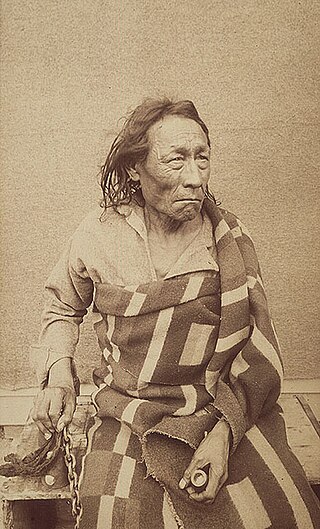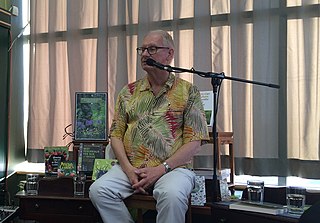
Philip Michael Ondaatje is a Sri Lankan-born Canadian poet, fiction writer and essayist.
Myrna Kostash is a Canadian writer and journalist. She has published several non-fiction books and written for many Canadian magazines including Chatelaine. Of Ukrainian descent, she was born in Edmonton, Alberta and educated at the University of Alberta, the University of Washington, and the University of Toronto. She resides in Edmonton, Alberta.

Major-general Sir Samuel Benfield Steele was a Canadian soldier and policeman. He was an officer of the North-West Mounted Police, head of the Yukon detachment during the Klondike Gold Rush, and commanding officer of Strathcona's Horse during the Boer War.
Each winner of the 1973 Governor General's Awards for Literary Merit was selected by a panel of judges administered by the Canada Council for the Arts. The winners were given a $2500 cash prize.

Big Bear, also known as Mistahi-maskwa, was a powerful and popular Cree chief who played many pivotal roles in Canadian history. He was appointed to chief of his band at the age of 40 upon the death of his father, Black Powder, under his father's harmonious and inclusive rule which directly impacted his own leadership. Big Bear is most notable for his involvement in Treaty 6 and the 1885 North-West Rebellion; he was one of the few chief leaders who objected to the signing of the treaty with the Canadian government. He felt that signing the treaty would ultimately have devastating effects on his nation as well as other Indigenous nations. This included losing the free nomadic lifestyle that his nation and others were accustomed to. Big Bear also took part in one of the last major battles between the Cree and the Blackfoot nations. He was one of the leaders to lead his people in the last, largest battle on the Canadian Plains.

Aritha van Herk,, is a Canadian writer, critic, editor, public intellectual, and university professor. Her work often includes feminist themes, and depicts and analyzes the culture of western Canada.

Canadian Mennonite University (CMU) is a private Mennonite university located in Winnipeg, Manitoba, Canada. It is affiliated with Mennonite Church Canada and the Mennonite Brethren Church of Manitoba. It has an enrolment of 1,607 students. The university was chartered in 1999 with a Shaftesbury campus in southwest Winnipeg, as well as Menno Simons College and a campus at the University of Winnipeg.

David Bergen is a Canadian novelist. He has published eleven novels and two collections of short stories since 1993 and is currently based in Winnipeg, Manitoba, Canada. His 2005 novel The Time in Between won the Scotiabank Giller Prize and he was a finalist again in 2010 and 2020, making the long list in 2008.
Jean Val Jean is a 1935 novel by Solomon Cleaver. It is a much abbreviated retelling in English of Victor Hugo's 1862 novel Les Misérables.

Elizabeth Grace Hay is a Canadian novelist and short story writer.
Height of the Rockies Provincial Park is a provincial park in the Canadian Rockies of south eastern British Columbia, Canada. It is located west of the Continental Divide, adjacent to Elk Lakes Provincial Park.

Armin Wiebe is a Canadian writer from Winnipeg, Manitoba, best known for his humorous novels about Mennonites. Wiebe is regarded as one of the pioneers of humorous Mennonite writing in English and is known for his incorporation of Plautdietsch words within his English texts.

Francis Jeffrey Dickens was the third son and fifth child of Victorian English novelist Charles Dickens and his wife Catherine Dickens née Hogarth.

The Double Hook is a novel written by Sheila Watson, which is considered "a seminal work in the development of contemporary Canadian literature." Published in 1959, The Double Hook is written in a style more like prose poetry than fiction. It is often considered to be Canada's first modernist novel due to how it "departs from traditional plot, character development, form and style to tell a poetic tale of human suffering and redemption that is at once fabular, allegorical and symbolic." The Canadian Encyclopedia declares that: "Publication of Watson's novel The Double Hook (1959) marks the start of contemporary writing in Canada."
Andrew G. A. Russell, was a Canadian wilderness guide, outfitter, author, photographer, filmmaker, rancher, conservationist, and environmentalist. In recognition of his environmental advocacy he received honorary degrees from the University of Lethbridge, the University of Calgary, and the University of Alberta. In 1976, he received the Julian T. Crandall Award for his efforts in conservation, and in 1977 he was presented with the Order of Canada by the Governor General of Canada.

Random House of Canada was the Canadian distributor for Random House, Inc. from 1944 until 2013. On July 1, 2013, it amalgamated with Penguin Canada to become Penguin Random House Canada.
NeWest Press is a Canadian publishing company. Established in Edmonton, Alberta, in 1977, the company grew out of a literary magazine, NeWest Review, which had been launched in 1975. Early members of the collective that founded the company included writer Rudy Wiebe and University of Alberta academics Douglas Barbour, George Melnyk, and Diane Bessai.
Mennonite literature emerged in the mid-to-late 20th century as both a literary movement and a distinct genre. Mennonite literature refers to literary works created by or about Mennonites.
Elmer E. 'Al' Reimer (1927–2015) was a Mennonite writer from Steinbach, Manitoba. Reimer was an important literary critic and writer in the emergence of southern Manitoba Mennonite literature during the 1970s and 80s. Born in Landmark, Manitoba, Reimer grew up in Steinbach and received his PhD at Yale University. He taught English literature at University of Winnipeg for many years.











